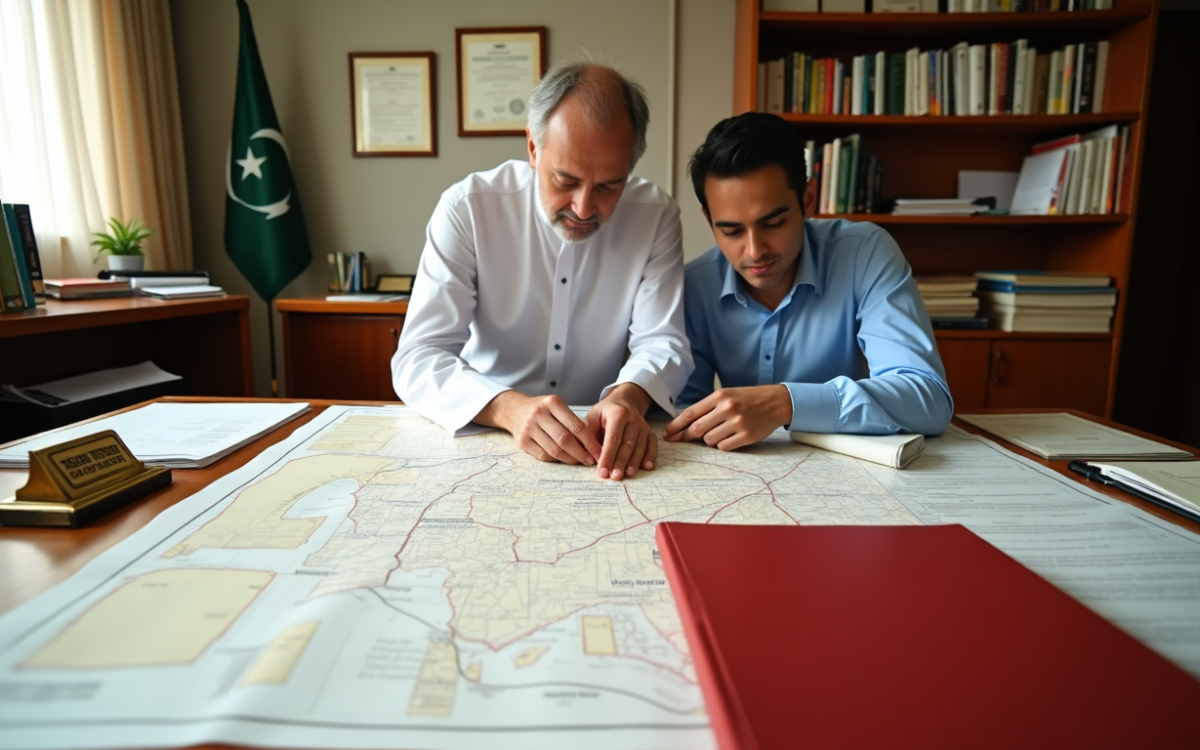Less than 8.5% of landowners in Pakistan control more than 42% of the agricultural land. This stark reality shows how complex Pakistan’s property market has become.
Buying property in Pakistan comes with its own set of challenges. The country’s land records remain outdated, and properties often have multiple registrations. Boundary disputes happen frequently. The situation becomes even more complicated when you factor in the rapid urban growth and scarce land resources. Property disputes surface regularly, especially with ancestral properties and Islamic inheritance laws. If you’re planning to Buy Land Pakistan understanding these challenges is crucial.
The legal framework is a vital part of property ownership in Pakistan, whether you plan to invest or buy for personal use. A clear path exists for safe property acquisition through the Transfer of Property Act of 1882 and constitutional protections under Article 23. To successfully Buy Land Pakistan, you just need to know what to look for.
This piece will guide you through the steps to Buy Land Pakistan safely. You’ll learn how to avoid common legal pitfalls that could drain your time, money, and peace of mind. With proper knowledge and due diligence, you can confidently Buy Land Pakistan without unnecessary complications.
Understanding Land Categories in Pakistan
Pakistan’s land ownership system uses a clear classification method that shows how people can use and transfer properties. You should know these categories before you think about buying land in Pakistan.
State-owned vs. privately owned land
The Pakistani land system has three basic ownership types. State-owned land, which people call ‘Sarkari Zameen,’ belongs to federal or provincial governments. These properties help run public institutions, support community welfare, and drive development projects. Article 173 of the constitution states that property without a rightful owner becomes state property.
Private ownership lets you retain control of your land within legal bounds. You can sell, gift, or exchange your property if you own it privately. Muslim personal law ensures your legal heirs automatically get your private land when you pass away.
Village common land (Shamilat) makes up the third type, where village communities share ownership. These areas serve community needs with grazing grounds, graveyards, and community buildings.
Agricultural, residential, and commercial classifications
Rural agricultural properties are a big part of Pakistan’s economy. The agriculture sector accounts for 18.9% of Pakistan’s GDP and gives jobs to 42.3% of workers. These properties are a great way to get investment returns through leasing deals. Owners can earn both rent and a share of crop profits.
Residential properties top the list of Pakistan’s most popular real estate investments. You’ll find several housing types:
- Single-family homes
- Apartments and flats
- Townhouses
- Penthouses
- Studio apartments
Commercial properties focus on business activities and making money. Offices, shops, warehouses, and other businesses occupy these spaces. Location, easy access, and market demand usually determine commercial property values.
Special zones and restricted areas
Special Economic Zones (SEZs) stand out in Pakistan’s property system. These zones must have at least 50 acres and follow the Special Economic Zones Act of 2012. Pakistan now has 24 approved SEZs. They offer several benefits:
- One-time exemption from customs duties
- Optimized regulatory processes
- Better infrastructure support
- Good locations near transportation hubs
Foreign investors face some limits when buying property in Pakistan. They can only own up to 18% of the total land area. The rules also say foreign nationals can’t:
- Buy more than 300 square meters in provincial capitals
- Own agricultural land without special permission
- Purchase properties in restricted provinces like Sindh and Baluchistan
The Board of Investment (BoI) keeps improving these zones with regular policy updates and better infrastructure. This work helps attract both local and international investment while following regulations.
Essential Documents for Land Purchase
Proper documentation is the life-blood of property transactions in Pakistan. A complete understanding of key documents will help protect your investment from legal issues.
Title deed verification
The title deed proves property ownership. This vital document outlines the owner’s legal rights and describes property details, including boundaries and dimensions. You should check if the title deed is registered in the seller’s name and verify its authenticity at the local land registry office before finalizing any deal.
The Punjab Land Records Authority, which is 2017 old through PLRA Act-2017, keeps computerized land records under the Board of Revenue’s administrative control. Their modern system makes shared verification of property documents possible through integrated technology.
Land record certificates
A complete Record of Rights (Misal-e-Haqiat) gets updates every 25 years through settlement operations. The authorities prepare Jamabandi every four years with the Register of Mutations (Intaqalaat). These records show:
- Exact details of land ownership
- Total land area owned by individuals
- Number of land parcels
- Precise locations within villages
No Objection Certificates (NOCs)
NOCs are legal documents that government institutions issue. These certificates confirm that property societies follow all prescribed rules and regulations. Development authorities – CDA, RDA, PDA, LDA, or SBCA – give NOC certifications based on:
- Approved master plan
- Layout plan compliance
- Construction material standards
- Environmental considerations
- Tax compliance
- Legal land acquisition status
Banks need NOCs to process home loans, which makes these certificates significant for property deals. The cost to get an NOC ranges from 500 to several thousand rupees, based on the real estate’s scale.
Tax records and clearances
Property tax receipts show that previous owners paid regularly. You should verify these documents to avoid future financial problems. Tax records must show:
- Amount paid
- Period covered
- Property description
The Board of Revenue manages the property registration process. They have optimized document verification through their eStamp system and computerized Registration of Deed (ROD). This electronic system improves record keeping through automation.
To improve security, get an encumbrance certificate that shows the property has no mortgages, pending loans, or other financial obligations. This certificate, along with proper tax documentation, will give a clear and legally sound property transaction.
Step-by-Step Property Buying Process
A methodical approach helps you find the perfect property. Following a well-laid-out process reduces risks and will give a secure investment in Pakistan’s real estate market.
Researching properties in Pakistan
The Pakistani real estate sector has shown remarkable growth, attracting both domestic and international investors. Start by learning about 20-year old housing societies like DHA and Bahria Town that provide secure ownership and modern amenities. These developments follow strict building codes and offer resilient infrastructure support.
Property inspection checklist
A full picture prevents future issues. The structural integrity of the property needs your attention, specifically:
- Foundation stability and wall cracks
- Plumbing system functionality
- Electrical wiring conditions
- Roof integrity and drainage systems
The inspection should verify ventilation quality and natural light availability. Test all electrical outlets to ensure you have enough power points. Pre-constructed properties need careful checking of fixtures, fittings, and built-in cabinets.
Negotiation strategies
Property negotiations need preparation and patience to succeed. Start with an offer 5-10% below the asking price. Market research and comparable property values strengthen your offer. These factors matter during negotiations:
- Pre-approved financing status
- Market conditions and trends
- Property condition assessment
- Seller’s motivation and timeline
Drafting a sale agreement
A sale agreement makes the transaction terms official between buyer and seller. The Registration Act 1908 requires proper registration of all property agreements. The agreement should specify:
- Complete property description
- Payment terms and schedule
- Possession timeline
- Responsibilities of both parties
Payment methods and security
Bank drafts or pay orders are the safest ways to pay for property transactions. These tools keep you secure and maintain transaction records. Larger purchases work better with split payments:
- Initial token money (1-2% of property value)
- Main payment through bank instruments
- Final payment upon completion of legal transfer
Note that you should get proper receipts for all payments and keep detailed documentation throughout the process. First-time buyers should keep extra funds beyond the purchase price to cover registration fees, stamp duties, and other related costs.
Legal Registration and Transfer Procedures
The last stage of property acquisition needs careful legal steps to protect your ownership rights. Pakistan’s property transfer system works under the Transfer of Property Act of 1882, which provides a well-laid-out process for ownership changes.
Mutation process explained
Property mutation, also called ‘Intiqal’ or ‘Fard Badar’, is a vital process that updates land revenue records after ownership changes. This process gets legal recognition through:
- Patwari’s field verification
- Revenue Officers’ document validation
- Updates in government databases
You don’t need mutation certificates, but experts suggest starting the process within 3-6 months of purchase to get complete legal ownership. The process matters because it proves ownership, helps get utility connections, and keeps tax records up to date.
Registration with relevant authorities
The local registrar’s office where your property is located handles the registration. The Board of Revenue oversees everything and makes sure legal standards are met through:
- Document authenticity checks
- Property evaluation on site
- Ownership title delivery
New buyers should know that both parties must visit the sub-registrar’s office with two witnesses. The office records verbal agreements in the Inteqal (Mutation) Register and gives out an official receipt.
Stamp duty and tax payments
Each province has different property registration fees. Current rates include:
- Stamp Duty: 5% of property value
- Registration Fee: PKR 500 for properties up to 5 lac, PKR 1000 for higher values
- Corporation Fee: 1% of property value
- K-Tax: 2% for non-tax filers, 4% for tax filers
The National Bank of Pakistan collects these one-time payments. The Board of Revenue’s eStamp system and computerized Registration of Deed (ROD) have made this process more efficient.
Timeline for property transfer completion
Property transfer follows these time frames:
- Document submission and verification: 3-5 working days
- Authorities’ physical verification: 7-10 days
- Registration certificate delivery: 8 working days after filing the deed
- Mutation process completion: Up to 30 days for record updates
The Punjab Land Records Authority, which started through PLRA Act-2017, keeps computerized records under the Board of Revenue’s watch. This modern system combines technology solutions to speed up transfers.
Buyers should get an encumbrance certificate to confirm the property has no mortgages or pending loans. In spite of that, mutation entries only suggest ownership rather than prove it completely. That’s why you need to keep all documents safe during the transfer process for future use.
Common Legal Traps When Buying Property in Pakistan
Pakistan’s real estate market demands constant watchfulness to protect your investment from legal traps. Property fraud cases continue to rise. Recent surveys show encroached state land worth 5.5 trillion PKR throughout the country.
Fraudulent sellers and documentation
False property listings pose one of the most important threats in Pakistan’s real estate market. Scammers create fake listings for properties they don’t own or have permission to sell. Common fraud schemes include:
- Double selling – selling the same property to multiple buyers
- Identity theft through fake documentation
- Fake property owners making unauthorized sales
- False claims about property value or legal status
Encroachment issues
Property buyers face substantial risks from encroachment – the unauthorized occupation of property. Major cities like Karachi, Lahore, and Islamabad have encroached land worth 2.6 trillion PKR. The Prevention and Removal of Encroachments Model Bye-Laws 2018 defines two types of encroachment:
- Private property encroachment – affecting ownership rights
- Public property encroachment – creating problems like traffic congestion and development barriers
Authorities can demolish unauthorized structures within two days of issuing orders under the Sindh Public Property Act and Khyber Pakhtunkhwa Public Property Act.
Hidden liens and encumbrances
Property buyers often face unexpected costs from municipal liens. These unrecorded claims may include:
- Utility violations
- Code infractions
- Special assessments
- Permitting issues
Old encumbrances stay legally valid whatever their age. Standard title searches might miss potential issues, so complete municipal lien searches become crucial.
Inheritance complications
Common property inheritance disputes stem from:
- Unclear inheritance laws
- Multiple heir claims
- Contested wills
The Transfer of Property Act of 1882 and provincial land revenue laws control inheritance-related property transfers. These rules ensure proper documentation and legal compliance during inheritance.
You can protect yourself from these legal traps by:
- Checking seller credentials through official channels
- Getting complete title searches
- Securing municipal clearance certificates
- Working with qualified legal professionals to verify documents
The Board of Investment updates policies regularly to make property transactions smoother. Yet, anyone looking to buy property in Pakistan must understand these common legal pitfalls.
Conclusion
Buying land in Pakistan needs careful attention to detail and proper legal requirements. Your investment stays protected from potential disputes when you understand land types, get the right documents and follow the correct purchase steps.
Smart buyers research properties extensively and inspect them carefully. They keep all documentation complete during the purchase process. Clear ownership rights come from legal registration through official channels, quick mutation processes and proper tax payments.
Property fraud remains one of the most important concerns in Pakistan’s real estate market. Your investment stays safe when you stay alert to common traps like fake sellers, property disputes, hidden claims and inheritance issues. This knowledge helps you confidently direct your way through Pakistan’s property market without getting into pricey legal troubles.








1 Comment
Inventore porro et est dicta tempora. Facilis velit reprehenderit rerum ea cum. Et iusto nobis quam rerum. Suscipit perferendis vel dolore iste. Ducimus aliquam consequatur magnam animi. in corporis repudiandae in aut magnam. at dolorem nobis sunt quis laborum qui. Omnis hic voluptas distinctio quia Ut quo in